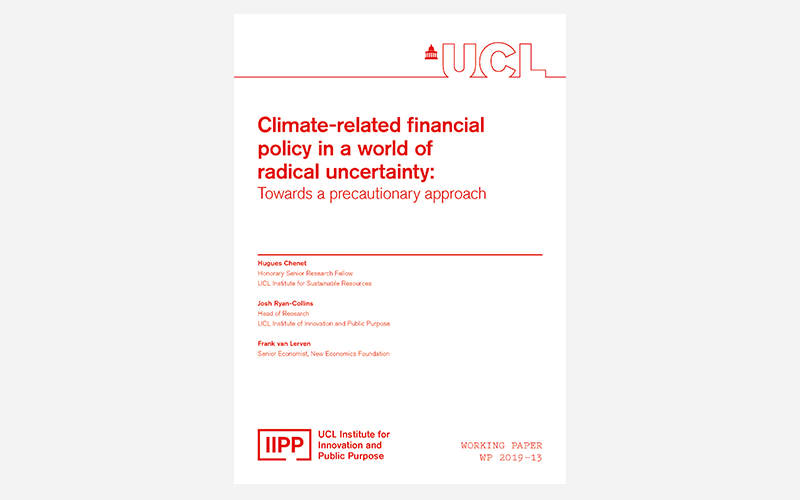Climate-related financial policy in a world of radical uncertainty
Towards a precautionary approach

23 December 2019
UCL Institute for Innovation and Public Purpose (IIPP) Working Paper Series: IIPP WP 2019-13
Authors
- Hugues Chenet | Honorary Senior Research Fellow, UCL Institute for Sustainable Resources
- Josh Ryan-Collins | Head of Finance and Macroeconomics, Senior Research Fellow, UCL Institute of Innovation and Public Purpose
- Frank van Lerven | Senior Economist, New Economics Foundation
Reference
Chenet, H., Ryan-Collins, J. and van Lerven, F. (2019). Climate-related financial policy in a world of radical uncertainty: Towards a precautionary approach. UCL Institute for Innovation and Public Purpose, Working Paper Series (IIPP WP 2019-13). Available at: https://www.ucl.ac.uk/bartlett/public-purpose/wp2019-13
Abstract
Climate-related financial risks (CRFR) are now recognised by central banks and supervisors as material to their financial stability mandates. But while CRFR are considered to have some unique characteristics, the emerging policy agenda for dealing with them has largely focused on conventional market-based solutions. Current policy emphasises information gaps that prevent the accurate assessment of market risk. The assumption is that these gaps can be remedied via disclosure, transparency, scenario analysis and stress testing, which will enable markets to self-correct. We argue this approach is misguided as CRFR are characterised by radical uncertainty and hence ‘efficient’ price discovery is not possible. Instead, a ‘precautionary’ policy approach is proposed. Since climate change poses a severe and potentially irreversible threat, lack of scientific certainty as to its exact nature or timing should not prevent regulatory action to mitigate its impact. Such an approach justifies fully integrating CRFR into financial policy, including both prudential and monetary policy frameworks. Central banks and financial supervisors can and should actively steer market actors in a clear direction — towards a managed transition — to ensure a scenario that minimises harm to the financial system and the wider economy in the future.
 Close
Close

